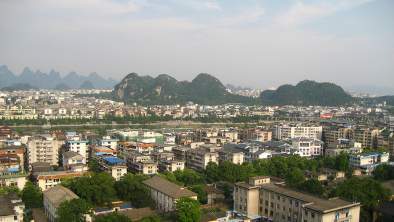The world has the same amount of water today as it has had for thousands of years. Thanks to the water cycle that we all learn about in school, nature recycles it. Nature’s way of doing things has worked well for millennia but water is now at risk of becoming non-renewable due to overexploitation. When the human demand for water exceeds nature’s ability to renew it, we are in trouble.
Two factors in particular have driven a massive increase in the demand for freshwater: dramatic growth in the world’s population over the last 150 years, and the economic expansion in countries that have gone from “developing” to “middle income.” For example, as a nation’s standard of living increases, so does its consumption of meat. Meat production is very water-intensive with 635 gallons required for one hamburger. Many consumer goods require a lot of water: for those of us who love our jeans, it takes 2,800 gallons of water per pair. In many cases these gallons are extracted from countries with the highest water scarcity. Economic growth has meant an insatiable demand for energy. Whether it is coal-burning, hydroelectric or nuclear power, huge amounts of water are required.
All this is exacerbated by climate change. Floods and droughts will be more frequent and severe, rainfall patterns will change, water temperatures will increase and sea levels will rise. The consequences on food and energy production are obvious. The world has to adapt to this change and make sure water is an integral part of any climate negotiations.
Agriculture, of course, is seen as the big water user. Some experts say up to 70% of freshwater is used to produce food globally. But the new villain may be our cities. More than half the world’s population now live in cities. Urban growth has risen as fast as the skyscrapers—or slums—that accommodate the new city dwellers. Recognizing this phenomenon, this year’s World Water Day theme is “Water for cities: responding to the urban challenge.” When large numbers of people live close together, water supply and sanitation service delivery becomes more complicated. Two million tons of human waste are disposed of in water courses every day. The vast majority of water supplied to people becomes wastewater that has to be treated to avoid polluting the environment and damaging peoples’ health.
Water is at the nexus of all things human: our food supply, energy production, personal health, economic prosperity. Whether it is the depletion of the Aral Sea, the Yellow River that now runs red from pollution or the Colorado River that no longer reaches the Pacific Ocean, we’re acting like the world has a never-ending supply. We waste untold amounts—up to 50% is not uncommon in urban systems according to the UN. We move it so we can play golf in the desert. We dump wastewater into the sea instead of recycling it. We drain wetlands to meet demand. If “Water is life”, we’re on the road to suicide.
What can we do? Fortunately, in recent decades there have been many initiatives to encourage water-saving technology, to change individual behaviour, and to manage wastewater better. Every effort to use less water or recycle it or capture more of it, helps. But technological miracles will not solve the water problems in poor countries that cannot afford the solutions, and changed behaviour can only go so far.
In recent years many political and corporate leaders have taken up the water cause. But they now need to make tough decisions about trade-offs, pricing, corruption, lack of human and financial capacity, and special interests, not to mention the questions surrounding water that crosses national borders. Ultimately, good water management is about good governance: when policies, laws, financing, and institutions that deal with water are transparent and coherent. Creating that environment requires government, civil society, and the private sector to work together.
Because water is the basis of human life and prosperity, improving its management and use is a prerequisite to poverty reduction. When governments invest in water management and infrastructure, they are investing in the economic and social development of their country. Every effort to reduce poverty may be commendable but investing in water management is indispensable.
Dr. Letitia A. Obeng, Chair
Dr. Ania Grobicki, Executive Secretary
(Photo: Li Axrup)
